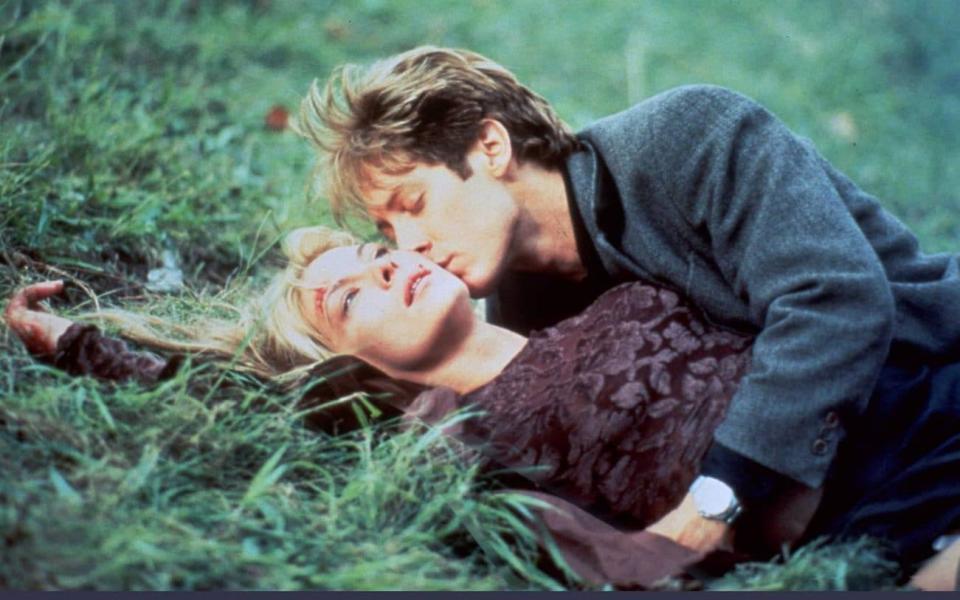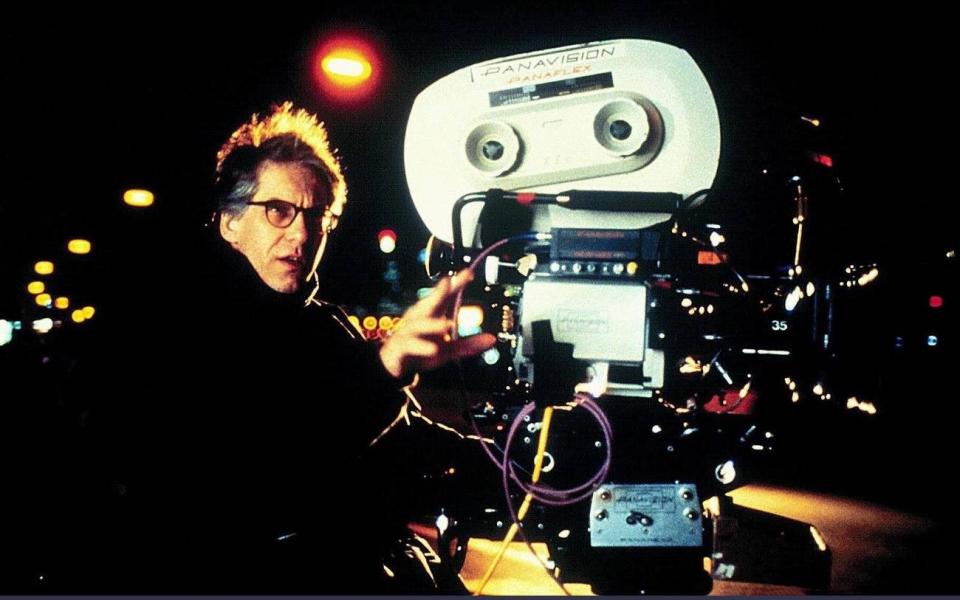‘Britain still has a repressive strain’: David Cronenberg on his ‘depraved’ classic, Crash

When David Cronenberg’s Crash premiered at the 1996 Cannes Film Festival, there was a controversy-revving reaction that shaped the film’s impact. Based on the 1973 novel by JG Ballard – which a New York Times reviewer called “the most repulsive book I've yet to come across” – Crash follows a subculture of misfits who derive sexual pleasure from car crashes: the collision, the wreckage, the injuries. Cronenberg’s adaptation was always on the road to controversy.
Evening Standard critic Alexander Walker slated Crash in a review from Cannes. The review headline – “A Movie Beyond the Bounds of Depravity” – underlined a ferocious press campaign, primarily driven by moral panic arbiters at The Daily Mail, to have Crash banned.
Back at the festival, Crash was nominated for the Palme d’Or and awarded a Special Jury Prize. The audience booed Cronenberg when he collected the award. “Some people walked out,” recalls Cronenberg. “There were some boos, there were some responding cheers. It was a very divisive kind of event. I have to say, we all kind of loved it.”
Francis Ford Coppola – that year’s jury president – announced the award “for originality, for daring and for audacity” but warned that some jury members “did abstain very passionately”. In fact, it was Coppola himself who abstained. Coppola was so against Crash that he refused to personally hand over the award.
“Whenever I see Francis he tends to remind me, ‘We gave you that prize, remember?’” says Cronenberg. “I have to bite my tongue to not say, ‘Except I know you didn’t want to give me the prize because you hated the movie!’”
Now Crash is gearing up for a re-release. A 4K restoration premiered at last year’s Venice Film Festival; next month it arrives in a bumper 4K Blu-ray edition. (Plans for a UK cinema re-release, however, have been shelved due to the current lockdown.)
Producer Jeremy Thomas originally suggested Crash to Cronenberg as a potential project, but Cronenberg only got a third of the way through Ballard's novel. “In some ways it’s a very extreme book,” says Cronenberg, speaking on the phone from his native Toronto. “But in some ways it’s very neutral – a deliberately flat kind of writing, very clinical. I was put out by that. I really didn’t understand it. I came back to it maybe a year later, and it was a completely different thing.”
Cronenberg’s adaptation steers closely to the novel: James and Catherine Ballard (James Spader and Deborah Kara Under) search for sexual gratification with an open marriage, but are unfulfilled by each extramarital tryst. “Maybe the next one,” Catherine whispers to James. When Ballard has a head-on collision with Dr Helen Remington (Holly Hunter), they become connected by the trauma.
They meet Vaughan (Elias Koteas) and his gang of crash survivors, including Gabrielle (Rosanna Arquette, wearing calipers and vaginal scars up her legs), who all get their kicks restaging famous car crashes, chasing down accident sites, and looking at crash victims – living or dead.

Vaughan describes his project as “the reshaping of the human body by modern technology”, a line which plugs directly into Cronenberg’s broader body of work. As director of science-fiction and horror films that include Shivers, Videodrome, and The Fly, Cronenberg is known as the pioneer of "body horror". (“Somebody invented that phrase,” laughs Cronenberg. “I don’t think of the body being horror at all. I think a body is rather beautiful.”) In those earlier films, horror manifests as fleshy, squelching, viscera; in Crash, it’s crunched-up metalwork, and already-formed scars fastened by steel pins. But the connecting tissue of Cronenberg’s films is more than skin deep: it’s the intersection of physical and psychological terror.
Filming and setting Crash in Toronto, Cronenberg – a car enthusiast and former race driver himself – found Crash a markedly different filmmaking experience. Logistically, it was like an action film, with multiple stunt drivers and cars. “And yet I’m not making an action picture,” he said at the time. “I have to use action picture imagery but in a way that does not feel like an action picture.” Indeed, these are not Hollywood-style car chases. In one scene, Vaughan re-stages the crash that killed James Dean. It ends with an ugly crunch. It’s like the difference between violence in Hollywood and real-life: not exciting, but frightening. “It looks very real because it was real,” says Cronenberg. “It was not a big budget film. There’s no CG – it’s all live.”

Even with a near-quarter century in the rear-view, during which time more extreme and graphic films have gone mainstream, Crash still feels profoundly unconventional. It begins with three sex scenes, and thrusts forward like a piston of turbo-charged eroticism: plot and character development are facilitated mostly through sex. “It’s one of Ballard’s great innovations,” says Cronenberg. “That is the plot.”
The characters all have sex with each other – including, inevitably, James and Vaughan, and James and the disabled Gabrielle – all spurred on by cars, crashes, and each other’s deformities. (The Daily Mail’s Christopher Tookey complained “They experiment pleasurably with gay sex, lesbian sex, and sex with cripples.” Words more grotesque than anything on screen.)
In the final scene, James runs Catherine off the road. She’s thrown from the car but isn't seriously hurt. “Maybe the next one,” says James as he has sex with her. The ultimate sexual gratification, it seems, will be injury, or even death.
Like the book, it’s difficult to say if Crash is science-fiction. Certainly, it’s set in a reality that’s not our own. They live within an infinite network of motorways, yet are strangely disconnected. “Ballard was really anticipating a psychology of the near-future,” Cronenberg once said about the emotional disassociation.
“The characters’ affect is very flat,” he tells me. “I suppose a psychiatrist might call it almost psychotic, or at least sociopathic. But these characters are trying to create a new version of love and sex, and its relation to technology, so you expect it to not be what is considered normal.” Cronenberg rejected an agent’s suggestion to add a narration, to be “a voice of comfort and to explain the film to everybody”.
The film premiered at Cannes on May 16, 1996. Everyone was surprised by the reaction – all except Cannes head honcho, Gilles Jacob, who had told Cronenberg: “I’m going to put your movie in the middle of the festival because I want it to explode there like a bomb.”
Cronenberg remembers a now-infamous press conference among the furor (“It was feisty,” he says. “One of the great Cannes press conferences”). There were around 300 journalists present, with more watching on remote screens which had been set up to satisfy the morbid interest. Cronenberg was there with JG Ballard, Jeremy Thomas, and the cast. An outraged Finnish journalist accused Cronenberg of destroying the book. Ballard immediately disagreed, saying the movie was better than his book. “An extraordinarily generous thing for an author to say,” Cronenberg says. “That shut the journalist up. What’s he going to say after that?”
Interviewed by the BFI recently, Jeremy Thomas recalled the Evening Standard's Alexander Walker was there, “waving a newspaper, shouting from the back, ‘Travesty! It’s outrageous!’” said Thomas. Walker later distanced himself from the much-repeated “beyond depravity” headline, which was written by a subeditor. But he did write that Crash was “pornography” and featured “some of the most perverted acts and theories of sexual deviance I have ever seen propagated in main-line cinema”.
The Daily Mail, fuelled by editorials from critic Christopher Tookey, began a campaign to prevent Crash being passed by the BBFC. As the film was picked up for the London Film Festival, the Daily Mail front page on November 9, 1996 read: “Ban This Car Crash Sex Film”. Tookey wrote that Crash was “the point at which even a liberal society should draw the line”.
“For an entire year there was not a day – not one day – that there wasn’t some mention of the movie in the British press or on television,” says Cronenberg. Indeed, there were over 400 articles about Crash. It was branded “violent” (it really isn’t), “sick”, and “depraved”. The Mail warned there would be “uproar” if the BBFC passed it. Heritage Secretary Virginia Bottomley urged local councils to ban it, though predictably, she hadn’t seen it. Westminster Council did ban the film, followed by four regional councils. “It’s still banned in Westminster,” says Cronenberg. “You can go to jail for screening it!”
The Guardian published a cartoon of Christopher Tookey in Ku Klux Klan outfit, about to burn a cinema. Tookey defended himself, saying that his problem was the attempt to “eroticise mutilations and fetishise orthopaedic appliances” and warned of the much-talked-about-but-rarely-substantiated “copycat effect”. He linked the film to “joy riding, ram-raiding, and reckless driving by the young.”
The BBFC passed Crash uncut on March 18, 1997. The Mail resorted to printing details of the BBFC examiners’ private lives. “We had our detractors in other places, but it was nothing like what happened in Britain,” says Cronenberg. In the US, media mogul Ted Turner, who owned the US distributor, tried to stall the film’s release. There were also reports of AMC cinemas having security guards to stop minors from entering.
Cronenberg doesn’t believe the controversy detracted from the art. “I always want my films to be seductive,” he says. “I don’t want them to be repulsive or repellent, but if they are to some people, so be it.” He suggests that what so deeply offended critics is that Crash did seduce them. “As is often the case, it appeals to them,” he says. “They find themselves actually attracted to it, and that feels wrong. The movie is seductive and rather beautiful. I think that scares people. There’s a strain in every society – but there’s certainly one in Britain – of repressiveness. Suppression of the id, in Freudian terms.”
I tell Cronenberg that like its detractors, I originally found it alienating and unpleasant. But watching again recently, it feels powerfully – and uncomfortably – evocative.
Cronenberg tells me that while watching the restoration, he was also newly struck by elements of his own film. In particular, he says, the strangeness of the characters. “Working with that material and with the actors, you became part of that Crash-sex subculture. Not that I had sex and crashes… perhaps unfortunately,” he laughs. “But it’s your reality. At this distance I could see how odd they were.”
If perspectives on Crash have changed – there’s certainly no cries against its depravity for the re-release – original detractor Francis Ford Coppola might even see it differently.
“I don’t know Francis well enough to have an insight into why he responded that way to the film,” says Cronenberg. “Is it because he’s Italian and Catholic? I have no idea. I also don’t know if he still feels that way about the film. But I doubt he’s going to want to his own 4K DVD.”
Crash is available on Blu-ray from December 14


